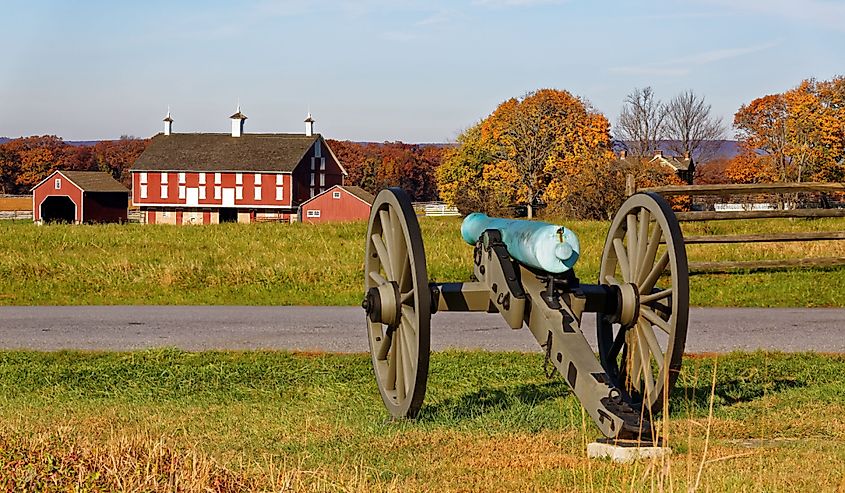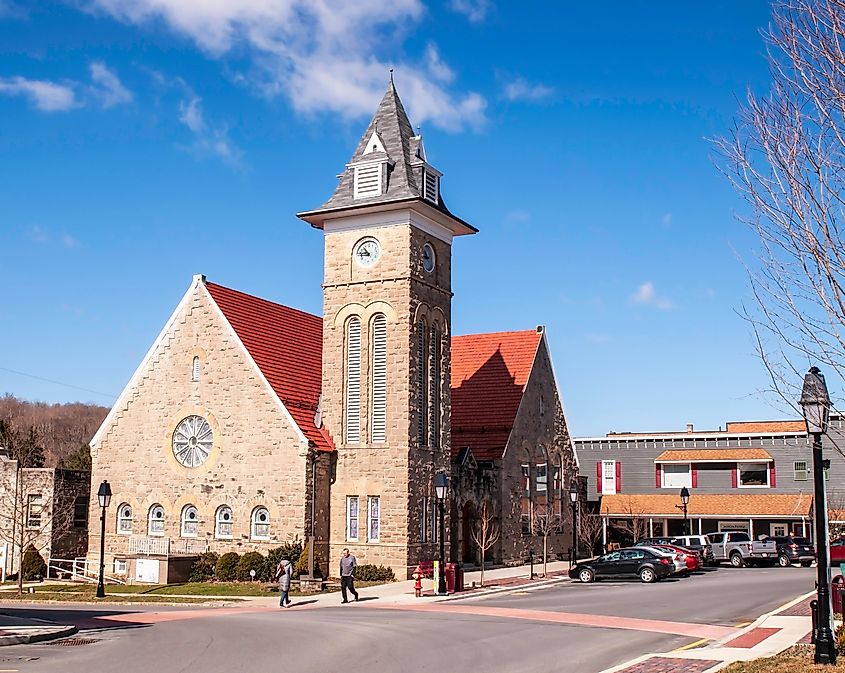
9 Must-See Historic Towns in Pennsylvania
Pennsylvania traces its beginnings to 1681 when it was founded by William Penn. As one of the thirteen original colonies, it’s a rich tapestry of American history, pivotal in events like the drafting of the Declaration of Independence and the U.S. Constitution, the Revolutionary War, Civil War, and Industrial Revolution. This colorful past is well preserved in several charming towns throughout the state, offering an exciting journey back in time with the opportunity to discover historical gems.
From historic mining towns to villages that were sites of 18th-century battles, these towns provide a window into the events that shaped the destiny of the Keystone State. You can immerse yourself in this history through the old-world architecture in their downtowns, quaint historical sites and landmarks, and unique traditions passed through generations. Prepare for a deep dive into America’s rich story in these must-see historic towns in Pennsylvania.
Gettysburg

For those interested in American military history, Gettysburg is home to some of the country’s best-preserved battle sites and war monuments. It is a treasure trove of historical landmarks exploring state and national history. The town is famous for the pivotal Gettysburg Battle of 1863, a crucial turning point during the Civil War. Today, the Gettysburg National Military Park offers a glimpse into this history, with a museum featuring relics and artifacts from the Civil War. Moreover, the Gettysburg Museum of History presents over 4,000 artifacts chronicling the Civil War, World War I, and World War II.

Although not his birthplace, Gettysburg is also significant for its connection to the 34th American president, Dwight D. Eisenhower. The Eisenhower National Historic Site, his former estate, offers insights into his life and legacy with diverse artifacts, relics, and memorabilia. After immersing yourself in the town’s history, you can visit the 1776 Dobbin House Tavern, the town’s oldest structure, for a wholesome meal.
York

York holds a special place in American history, being the location where the phrase “The United States of America” was first coined. While not the birthplace of the Articles of Confederation, which were drafted in Philadelphia, York played a significant role during their development. The York County History Center preserves a vast array of artifacts that explore the culture and history of the county, state, and nation. York also has a rich agricultural heritage, which was particularly prominent during the Industrial Revolution. The Agricultural & Industrial Museum showcases this history with interactive exhibits, including antique vehicles, a grist mill, and farm implements.

The Colonial Complex in York provides a glimpse into the town during the 18th century, featuring restored and reconstructed buildings such as a courthouse, homestead, and the Golden Plough Tavern. Beyond its historical significance, York boasts a vibrant community, best experienced at the Central Market House. This historic market, listed on the National Register of Historic Places, is a hub of local interaction and commerce.
Oil City

Oil City was a pivotal location in the development of the petroleum industry in America and globally. As one of the nation's most important oil boomtowns, it became the largest city in the Oil Region. The Oil Region National Heritage Area offers a journey through this history, encompassing the area around Edwin Drake’s 1859 oil well, the site that marked the beginning of the modern petroleum industry. The Venango Museum of Art, Science, & History in Oil City provides a broader perspective, with exhibits that illustrate the impact of the oil industry on local culture, past wars, and other societal elements of Venango County.

For antique enthusiasts, the Oil City Warehouse Mall, with its 34,000-square-foot space, is a treasure trove of unique items and potential souvenirs. Casey’s Restaurant & Lounge offers a delightful selection of pizzas, sandwiches, and baked goods, perfect for a meal complemented by a refreshing cocktail.
Carlisle

Carlisle's history dates back to the 1700s, marked by the establishment of a cabin by French fur trader James Le Tort. As the seat of Cumberland County, it is home to the Cumberland County Historical Society. This society's 16-gallery complex showcases over two centuries of local history through various artifacts. The historic downtown area features historical gems like the Old Graveyard and the Cumberland County Courthouses. However, Carlisle Barracks stands out as the country's second-oldest active military base, separate from the Carlisle Indian Industrial School, which was established later in 1879 for Native American children.
The U.S. Army Heritage and Education Center in Carlisle is a must-visit. This extensive museum complex includes both indoor and outdoor exhibits about the United States military, an archive, an events center, a café, and an interpretive gallery spread over a 56-acre campus. Additionally, the Carlisle Theater offers a range of live performances, from plays and concerts to musicals, in a family-friendly environment.
Easton

Easton, a small town in Northampton County, is situated at the confluence of the Lehigh and Delaware Rivers. It boasts several historical sites, including Northampton County Historical and Genealogical Society. Here, visitors can explore exhibits that trace Easton’s history from the Native American settlement period through the Industrial Revolution. The National Canal Museum is another highlight, offering insights into the Delaware & Lehigh National Heritage Corridor and its significance in American history.
The State Theater Center for the Arts, a historic venue with a capacity of 1,500, is listed on the National Register of Historic Places. It is a hub for those seeking to enjoy Broadway-style productions. For families, the Crayola Experience in Easton provides interactive, creative fun that is tailored for all ages.
Bedford

The small, historically rich town of Bedford may have a modest population, but it boasts a notable American presidential history. President George Washington established his headquarters here during the Whiskey Rebellion. The town's colorful history, including its role in the French Indian War and the Whiskey Rebellion, is well documented at the Fort Bedford Museum, which features a variety of exhibits and artifacts.
Another unique attraction in Bedford is the National Museum of the American Coverlet, dedicated to showcasing antique American woven coverlets, some dating back to the 19th century. Don't miss the quirky Big Coffee Pot on Telegraph Road, a notable roadside attraction built in 1927. And for a sweet treat, Bedford Candies offers hand-dipped chocolates and gourmet popcorn.
Lititz

Lititz is renowned for being home to the oldest commercial pretzel bakery in the United States, the Julius Sturgis Pretzel Bakery. Here, you can enjoy delicious pretzels and learn about traditional pretzel-making in a 19th-century setting. Lititz also prides itself on housing the oldest continuously operating boarding school for girls in the country, Linden Hall, established in 1746 by the Moravian Church.
For a deeper dive into local history, the Lititz Historical Foundation offers guided tours around the city, including the 1792 Johannes Mueller House. As you explore Lititz, be sure to stop by Moravian House Antiques for a unique souvenir from one of the town's most impressive collections.
Jim Thorpe

Jim Thorpe, named posthumously in honor of the famous Native American athlete who is buried there, is a small community in the Pocono Mountains of Pennsylvania. It boasts historical sites like the Mauch Chunk Museum & Cultural Center, which houses industrial and cultural artifacts that shed light on the area’s history and the legacy of Jim Thorpe, the athlete. The Asa Packer Mansion, built in 1861 by the philanthropist and founder of Lehigh University, showcases Victorian-era architecture and décor, offering a glimpse into upper-middle-class life in that period.
Visitors can also enjoy a stay at the historic Harry Packer Mansion Inn, completed in 1874, which offers beautiful views of the town. The Lehigh Gorge Scenic Railway is another attraction, providing scenic vistas of the Lehigh River gorge, especially picturesque in the fall.
Ligonier

Ligonier's history dates back to 1758, with the British establishment of Fort Ligonier during the French and Indian War. This fortress was crucial in securing British control of the region. As a former railroad hub, Ligonier has evolved while preserving its historical roots. Fort Ligonier offers guided tours that delve into the 18th century, highlighting the town's impact on American and global history. Additionally, Ligonier is home to Idlewild Park, established in 1878, and known as one of the oldest amusement parks in America, featuring a variety of classic attractions.
Today, Ligonier is a vibrant community. The Ligonier Country Market is a popular spot for fresh produce and a festive atmosphere. Art and history lovers will appreciate Allegory Gallery, showcasing unique gemstones, artisan beads, and handcrafted Czech glass.
In Conclusion
Exploring these small towns in Pennsylvania is a journey through America’s rich past. From Civil War sites to mining boomtowns, Pennsylvania’s legacy is captured in its architecture, museums, and cultural reenactments. Offering diverse historical experiences, these towns provide a unique glimpse into both state and national history, making them appealing destinations for history enthusiasts and casual visitors alike in the Northeastern United States.











